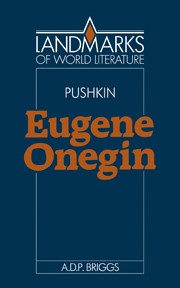Book contents
- Frontmatter
- Contents
- Preface
- Note on translations and references
- Chronology
- Chapter 1 The poetry of Eugene Onegin
- Chapter 2 Shades of unreality
- Chapter 3 The unreal reputations of Eugene Onegin and Tatyana Larina
- Chapter 4 Olga, Lensky and the duel
- Chapter 5 It is in verse, but is it a novel?
- Guide to English translations and further reading
Chapter 5 - It is in verse, but is it a novel?
Published online by Cambridge University Press: 05 November 2011
- Frontmatter
- Contents
- Preface
- Note on translations and references
- Chronology
- Chapter 1 The poetry of Eugene Onegin
- Chapter 2 Shades of unreality
- Chapter 3 The unreal reputations of Eugene Onegin and Tatyana Larina
- Chapter 4 Olga, Lensky and the duel
- Chapter 5 It is in verse, but is it a novel?
- Guide to English translations and further reading
Summary
Eugene Onegin claims on its title page to be a ‘novel in verse’. The verse, in a literal sense, speaks for itself; but can the work be properly described as a novel? First we are faced with the de facto acceptance of this appellation by all readers and critics over a century and a half. Some of the most rewarding essays on Onegin are to be found in histories of the Russian novel (as our bibliography indicates). Then we must remember the peculiar standing of this work in the dynasty of Russian literature; it is the novelists who look back on it as their revered patriarch. (We shall return to this point). Finally we must take account of the author's intentions. From the outset he described his work as a novel and, despite admitting that it would be ‘something like’ Byron's Don Juan, he was always eager to dissociate the two poetic narratives. Mirsky has summarised the three differences between them: unlike Don Juan, Eugene Onegin is direct rather than satirical, realistic and contemporary rather than dressed up in semi-Romantic fancifulness, and a work of integrated form and meaning, ‘a complete whole, with a beginning, a middle, and an end’ (Pushkin, p. 141). (It is also much superior in the quality of its poetry but that need not concern us now). But the real distinction is one of density and seriousness. The admiring descendants of this novel are animated by something of substance, something more than the charm and exquisite sense of form which first strike the eye.
- Type
- Chapter
- Information
- Alexander Pushkin: Eugene Onegin , pp. 99 - 113Publisher: Cambridge University PressPrint publication year: 1992

